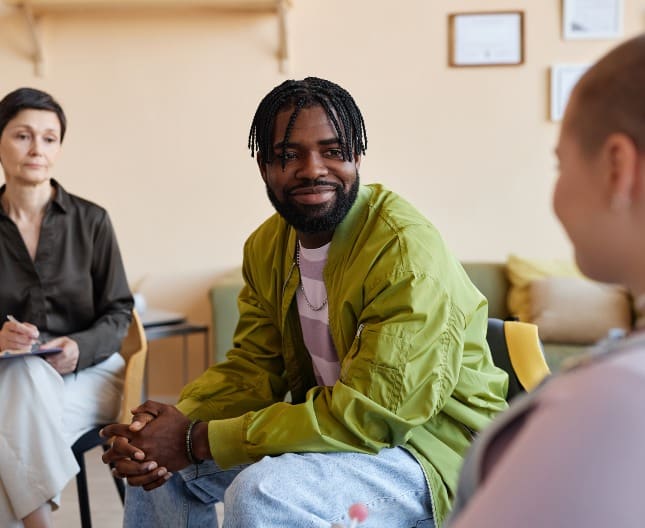


D’Amore Mental Health offers a comprehensive Intensive Outpatient Program (IOP) designed to provide structured mental health treatment while allowing clients to maintain their daily routines and responsibilities. Our IOP serves as both a step-down option for individuals transitioning from more intensive levels of care and as a direct entry point for those needing more support than traditional weekly therapy sessions.
At D’Amore, we understand that recovery is a personal journey. Our Intensive Outpatient Program provides the perfect balance of clinical support and personal independence, allowing you to practice new coping skills in real-world settings while receiving regular professional guidance.

Our Intensive Outpatient Program operates Monday through Friday, with flexibility to attend 3-5 days per week based on your individual needs and recovery progress. Sessions typically run for 3-4 hours per day, available in both morning and afternoon timeframes to accommodate various schedules. This balanced approach allows for intensive therapeutic intervention while enabling you to continue with work, education, or family responsibilities. Clients benefit from a comprehensive curriculum designed to build essential coping skills, address unhelpful thought patterns, and improve emotional regulation—all while maintaining connections to your personal life and support systems.
One-on-one sessions with licensed mental health professionals who will help you develop personalized strategies for managing your mental health challenges. These confidential sessions provide a safe space to explore your thoughts, emotions, and behavioral patterns while receiving dedicated attention from a therapist who understands your unique journey. Your therapist will work collaboratively with you to establish treatment goals, monitor progress, and make adjustments to your care plan as needed.
Structured group sessions focused on skill-building, emotional regulation, and peer support. These sessions foster a sense of community and shared understanding, reducing feelings of isolation that often accompany mental health challenges. Led by experienced facilitators, our groups cover topics such as stress management, healthy coping strategies, boundary setting, and interpersonal effectiveness. The group format provides opportunities to practice new skills in a supportive environment and receive real-time feedback from peers and professionals.
Regular evaluation and monitoring by psychiatric professionals who specialize in mental health treatment. Our psychiatrists work closely with the rest of your treatment team to ensure medication decisions complement your overall care plan. We take a thoughtful approach to medication, considering your complete health history, current symptoms, and treatment goals. Regular follow-up appointments allow for adjustments based on your response and any side effects you may experience.
A structured, goal-oriented therapy that helps identify and change negative thought patterns affecting your emotions and behaviors. CBT teaches you to recognize distorted thinking patterns and develop more balanced perspectives. Through practical exercises and homework assignments, you’ll learn to challenge negative thoughts, modify unhelpful behaviors, and develop healthier coping strategies that can be applied long after treatment ends.
An evidence-based approach that teaches mindfulness, distress tolerance, emotion regulation, and interpersonal effectiveness. DBT helps you develop skills to manage intense emotions, reduce conflict in relationships, and improve your quality of life. The dialectical framework emphasizes the balance between acceptance and change, helping you validate your experiences while working toward positive transformation.
Sessions that strengthen your support system and improve communication with loved ones. Family therapy recognizes that mental health challenges affect not just the individual but the entire family system. These sessions help family members understand your condition, develop healthy communication patterns, rebuild trust, and learn how to support your recovery journey. Family involvement significantly improves treatment outcomes and creates a more supportive home environment.
Practical training to enhance daily functioning and independence. These sessions focus on essential skills such as time management, budgeting, meal planning, self-care routines, and employment readiness. By strengthening these fundamental life skills, you’ll build confidence in your ability to navigate day-to-day challenges and maintain stability after completing the program.
Creative approaches that complement traditional talk therapy, including art therapy, music therapy, mindfulness practices, and recreational activities. These modalities offer alternative ways to express emotions, process experiences, and develop insights that might be difficult to access through conversation alone. Experiential therapies engage different parts of the brain and can be particularly helpful for processing trauma, reducing stress, and discovering new sources of enjoyment and meaning.
Clients typically attend the program 3-5 days per week, with sessions scheduled to accommodate work, school, or family commitments. As you progress in your recovery journey, the frequency of attendance may gradually decrease.
D’Amore’s Intensive Outpatient Program effectively addresses a wide range of mental health conditions, including:

At D’Amore Mental Health, our Intensive Outpatient Program offers distinct advantages that make it an effective treatment option for many individuals facing mental health challenges. IOP bridges the gap between intensive residential care and standard outpatient therapy, providing robust clinical support while allowing you to maintain your daily life connections.
This balanced approach helps you apply new skills in real-world settings immediately, creating a practical pathway to lasting recovery. The following key benefits highlight why many clients find our IOP particularly valuable in their mental health journey:
Unlike residential treatment, our IOP allows you to return home each day, maintaining connections with family, continuing with work or school, and immediately applying new skills in real-life situations. This approach bridges the gap between intensive treatment and everyday life.
Every client receives an individualized treatment plan based on their specific needs, challenges, and goals. Our experienced clinical team regularly reviews and adjusts these plans to ensure they continue to support your evolving recovery journey.
Our multidisciplinary team addresses all aspects of your mental health, combining various therapeutic modalities, medication management when appropriate, and holistic approaches to create a comprehensive treatment experience.
Group therapy sessions foster meaningful connections with peers who understand similar challenges. This community reduces isolation and provides mutual encouragement, accountability, and inspiration throughout the recovery process.
You’ll gain practical coping strategies and life skills that can be immediately implemented and refined in your daily life, with regular feedback and guidance from our clinical team.
Our Intensive Outpatient Program may be ideal for you if:

At D’Amore Mental Health, we firmly believe in your capacity to reclaim your mental well-being. Our Intensive Outpatient Program offers a flexible and empowering treatment option that can be the catalyst for transformative change in your life.
If you are ready to take the first step towards a brighter future, we invite you to contact D’Amore Mental Health today. Our compassionate and dedicated team is here to provide the support, guidance, and personalized care you need on your journey to mental wellness.
We accept most major insurance plans and are in-network with many providers, including Anthem, United Healthcare, Oscar, Optum, Kaiser Permanente, and more. Our admissions team can verify your benefits and discuss financial options to ensure treatment is accessible.
Call us at 714-375-1110 to learn more about our Intensive Outpatient Program and begin your journey toward improved mental health and well-being.
IOP is less intensive than PHP, typically meeting 3-5 days per week for 3-4 hours per day, while PHP generally runs 5 days per week for 6-8 hours daily. IOP offers more flexibility for those who need to maintain work, school, or family commitments.
The length of treatment varies based on individual needs and progress. Most clients participate in our IOP for 8-12 weeks, though this timeline can be adjusted based on clinical recommendations and personal recovery goals.
Yes, most insurance plans cover IOP services. D’Amore Mental Health is in-network with many major insurance providers, and our admissions team can help verify your benefits and explain any out-of-pocket costs.
Many clients transition to less intensive outpatient therapy after completing IOP. Our team works closely with you to develop a comprehensive aftercare plan that may include individual therapy, support groups, and other community resources to ensure continued progress and maintenance of gains made during treatment.
Yes, one of the main benefits of IOP is that it allows you to maintain your daily responsibilities while receiving intensive treatment. Our program offers flexible scheduling options to accommodate work, school, and family obligations.
Family involvement is a vital component of our treatment approach. We offer family therapy sessions, educational resources, and support for family members to help create a home environment conducive to recovery and continued wellness.

Jamie Mantel is a Licensed Marriage and Family Therapist, with a Psy.D. in psychology. Jamie has worked for non-profits for over 20 years working with agencies, as well as her private practice in Huntington Beach, California.